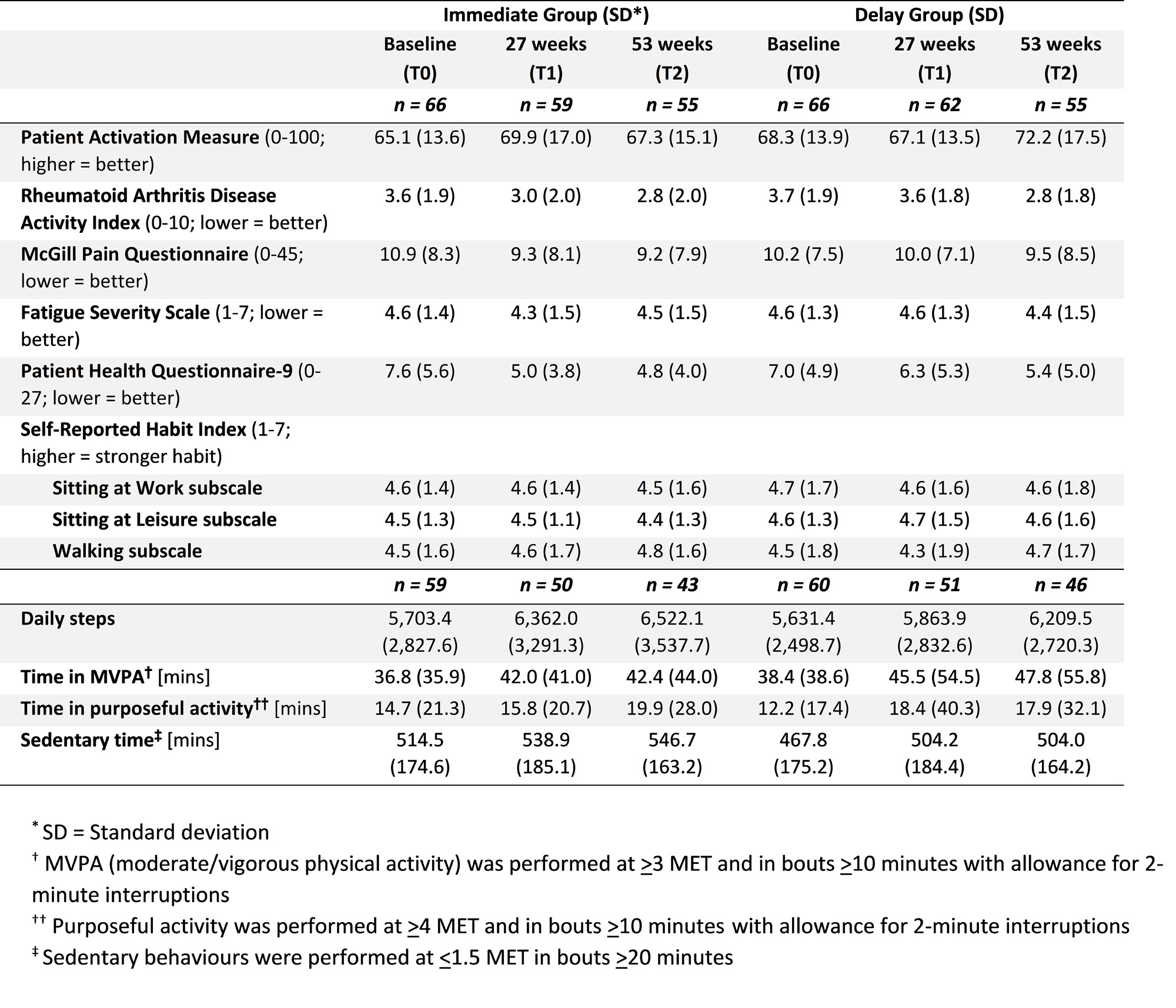Session Information
Session Type: Abstract Session
Session Time: 4:00PM-5:30PM
Background/Purpose: To achieve optimal health outcomes, people with rheumatoid arthritis (RA) need to know their symptom patterns and be able to practice self-care activities. With patient partners, we co-developed a Fitbit®-compatible app (OPERAS) for monitoring symptoms, disease activity, physical activity, and self-care goals. This study assessed a remote physical therapist (PT) counselling intervention using self-monitoring tools for enhancing self-management ability, physical activity participation, and health outcomes.
Methods: Eligible participants had a physician-confirmed diagnosis of RA. After baseline assessment (T0) and randomization, the ImmediateGroup (IG) received group education (2 hours), a Fitbit®, the app, and phone calls from a PT at weeks 2, 4, 6, 8, 13 and 26 to review their symptoms, treatment use, physical activity, and self-care goals. The Delay Group (DG) received a monthly e-newsletter unrelated to RA management until week 26, and then the intervention. Participants were assessed again at 27 weeks (T1) and 53 weeks (T2). Primary Outcome: Self-management ability assessed with the Patient Activation Measure (PAM-13). Secondary Outcomes: 1) RA Disease Activity Index (RADAI), 2) McGill Pain Questionnaire, 3) Fatigue Severity Scale, 4) Patient Health Questionnaire-9 (PHQ-9), 5) Self-Reported Habit Index for sitting/walking,6) daily time in moderate/vigorous physical activity and sedentary activity, and step count(SenseWear®).
We conducted intention-to-treat analysis using Generalized Linear Mixed-effect Models, adjusting forage and sex. The dependent variable was the change in outcome variable between two assessment time points. Three contrasts were assessed: 1) between-group difference (DG vs. IG) in the outcome change at T1 from T0 (T1-T0); 2) within-group difference (DG only): T2-T1 vs. T1-T0; and 3) average of contrasts 1 and 2. Contrast 3 was the primary contrast as it combined the between-group intervention effect and the within-group intervention effect.
Results: We recruited 132 participants (IG: n=66, 92.4% women; DG: n=66, 90.9% women). Both groups were similar in age [IG: 55.1 years (SD 13.3); DG: 56.9 years (SD 13.2)]. 80.3% completed the study during the COVID-19 pandemic. The adjusted mean difference in PAM-13 was 5.4 (95% CI: 0.9, 9.9). Contrast 3 was statistically significant for PAM-13 (Contrast coefficient: 5.3, 95% CI: 2.0, 8.7; p = 0.002).Examination of Contrasts 1 and 2 revealed that the effect on PAM-13 was underpinned by both the between group difference at T0-T1 and the within group change in the DG from T0-T1 (no-intervention period) to T1-T2 (intervention period) (Tables 1 & 2). Intervention effects were also found in RADAI (Contrast 3: -0.6, 95% CI: -1.1, -0.2), Fatigue Severity Scale (Contrast 3: -0.3, 95% CI: -0.5, -0.1), PHQ-9 (Contrast 3: -1.3, 95% CI: -2.3, -0.3), and Self-Reported Habit Index – walking subscale (Contrast 3: 0.4, 95% CI: 0.0, 0.7).
Conclusion: Remote PT counselling paired with use of self-monitoring tools improved self-management ability in people with RA. We also found significant effects in disease activity, fatigue, depression, and perceived walking habit at 26 weeks, suggesting the intervention had a positive effect on symptom management.
To cite this abstract in AMA style:
Li L, Xie H, feehan L, Lu N, Hoens A, English K, Davidson E, Backman C, Ramachandran S, Wang E, Therrien S, Mucha J, Liu-Ambrose T, Miller K, Shaw C, Lacaille D. Effectiveness of a Technology-enabled Self-monitoring and Physical Therapist Counselling Program for Improving Self-management Ability in People with Rheumatoid Arthritis: A Randomized Controlled Trial [abstract]. Arthritis Rheumatol. 2023; 75 (suppl 9). https://acrabstracts.org/abstract/effectiveness-of-a-technology-enabled-self-monitoring-and-physical-therapist-counselling-program-for-improving-self-management-ability-in-people-with-rheumatoid-arthritis-a-randomized-controlled-tria/. Accessed .« Back to ACR Convergence 2023
ACR Meeting Abstracts - https://acrabstracts.org/abstract/effectiveness-of-a-technology-enabled-self-monitoring-and-physical-therapist-counselling-program-for-improving-self-management-ability-in-people-with-rheumatoid-arthritis-a-randomized-controlled-tria/


